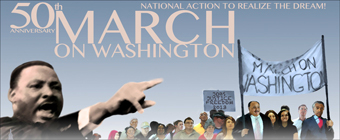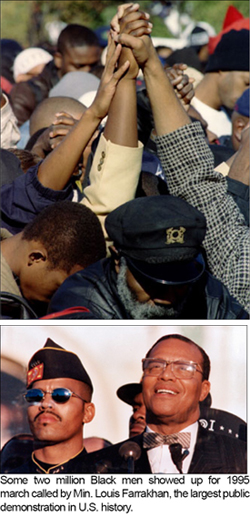Farrakhan Litmus Test for Washington March?
By Richard B. Muhammad -Editor- | Last updated: Aug 16, 2013 - 9:23:41 AMWhat's your opinion on this article?

|
Some progress has been made since that fateful day in the Nation’s Capitol, but on most minds today are frightful conditions in Black America, a determined effort to turn back the clock and questions about where we go from here.
“In light of the recent Supreme Court ruling negating a key section of the Voting Rights Act, the ruling in the George Zimmerman case, and other current and crucial civil rights issues, march organizers will push for immediate action from Congress,” declared a message from the National Action Network, whose president Rev. Al Sharpton is a leading march organizer along with Martin Luther King III, the son of the slain civil rights leader and president of Realize the Dream.

|
The group announces the Rev. Sharpton, Martin Luther King, III, the families of Trayvon Martin and Emmett Till; Congressman John Lewis; Nancy Pelosi, House Democratic Leader; Democratic Whip Steny Hoyer; Randi Weingarten of the American Federation of Teachers; Lee Saunders of AFSCME; Janet Murguia of the National Council of LaRAZA; Mary Kay Henry of the Service Employers International Union; Dennis Van Roekel of National Education Association (NEA) are among major speakers.
Each of these speakers occupies a certain prominence and importance in American life. It is obvious that they are seen as champions or Black allies and those who share a progressive vision for society.
We respectfully note that one name is prominent by its omission: the Honorable Minister Louis Farrakhan of the Nation of Islam. While we do not wish to foster disunity or make some uncomfortable, questions must be asked: Why is Farrakhan missing? Have Black leaders and organizers of this significant gathering once again avoided the Minister and the Nation of Islam? And is the absence of the man and the movement an indicator that once again we are more concerned with making others comfortable than dealing with the mounting crisis in our community and in this country?
The question isn’t raised out a concern for prominence or any vain acknowledgement of Min. Farrakhan—though a man who has soldiered for Black America for nearly 60 years is certainly deserving of respect. The question is raised because Min. Farrakhan is a man whose divine insight, guidance, love and humility are sorely needed.
This 80-year-old leader has supported virtually every Black cause, has spoken out on behalf of the poor, warned against rushing headlong into war, has offered a way to peace and justice, and has offered solutions to the crisis stalking Black America and America herself.
Most of the Black leaders who will attend the march and speak have been supported by Min. Farrakhan as testament to his sincere devotion to our people, respect for the contributions of others and understanding that a Black United Front is crucial for our survival.
Across the country, Nation of Islam members, mosques and study groups offer places of refuge and storehouses of knowledge to help end fratricidal violence, self-hatred and a pitiful, perpetual call for help from a position of weakness and subservience.
But in 2013 are we so weak and of such low character that we would act as though this man does not exist? This is the same man who called for a million men in 1995 and nearly 2 million men showed up—despite derision, scorn, vehement opposition and religious gangbanging. And with a platform established by the Nation, Black nationalists, independent Black preachers, the Black press, and right thinking Black activists, grassroots organizers and organizations, the gathering was an incredible success.
The Million Man March, despite almost overwhelming opposition, remains the largest public demonstration in the history of this country--and one of the largest in world history. It was at least four times larger than the march in 1963.
And, according to the Joint Center for Political and Economic Studies, the Million Man March turned congressional and presidential elections in 1996, putting Bill Clinton back in office and defeating a Republican revolution led by Newt Gingrich. That march also led to thousands of adoptions, reunification of Black fathers with sons, increased efforts to halt gang wars and gang violence and a powerful image of sober-minded, unified Black men working to shoulder their responsibility. Have those who spoke to the world that day from a platform they did not create forgotten that great day? Have they forgotten the vow of “operational unity” that went forth after the shameful offer and rescinding of an invite for Min. Farrakhan to speak in 1993 at the 30th anniversary of the march? Have they forgotten that our people are actually in a crisis?
Min. Farrakhan does not need to be acknowledged as legitimate by those who determine the agenda and outcome of this march or any other march. His place is assured with Allah (God) and our enemy’s inability to stop him is verification enough. But Black America needs Farrakhan make no mistake about that. Avoiding him, denying him, fleeing from him doesn’t assure success, it helps lead to disaster. Disaster because such actions are out of synch with the time and its demand that we do something for ourselves and have the courage to act on our own behalf. Appeals to a recalcitrant Congress and words from a racially reluctant president won’t solve our problems, and neither will efforts governed by fear. Even if America again rejects a check calling for justice, we should not be too afraid to embrace our champion and present it.
Richard B. Muhammad
Editor
The Final Call Newspaper
INSIDE STORIES AND REVIEWS
-
-
About Harriett ... and the Negro Hollywood Road Show
By Rabiah Muhammad, Guest Columnist » Full Story -
Skepticism greets Jay-Z, NFL talk of inspiring change
By Bryan 18X Crawford and Richard B. Muhammad The Final Call Newspaper @TheFinalCall » Full Story -
The painful problem of Black girls and suicide
By Charlene Muhammad -National Correspondent- » Full Story -
Exploitation of Innocence - Report: Perceptions, policies hurting Black girls
By Charlene Muhammad -National Correspondent- » Full Story -
Big Ballin: Big ideas fuel a father’s Big Baller Brand and brash business sense
By Bryan Crawford -Contributing Writer- » Full Story






 Click Here Stay Connected!
Click Here Stay Connected!








